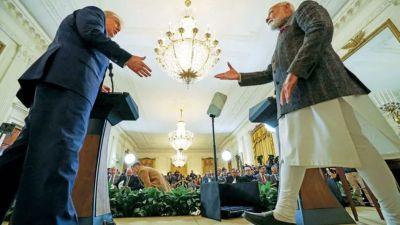‘Makes no sense’: Supreme Court slams Tamil Nadu Governors for sitting on Bills
The bench sought to know why the Governor had kept the Bills pending for three years before declaring that he was withholding assent.
 The court sought to know that going by the AG's argument, what is the Governor expected to do once he withholds assent but does not ask the Assembly to reconsider. (Express File)
The court sought to know that going by the AG's argument, what is the Governor expected to do once he withholds assent but does not ask the Assembly to reconsider. (Express File) THE SUPREME Court Thursday questioned Tamil Nadu Governor R N Ravi’s decision to withhold assent to some Bills presented to him by state legislature and said “he seems to have adopted his own procedure”.
Hearing the Tamil Nadu government’s petitions against the Governor withholding assent on certain Bills and referring some to the President, Justice J B Pardiwala, presiding over a two-judge bench, said, “It doesn’t make any sense… (Governor) saying that ‘I withhold assent but will not ask you to reconsider the Bills’ and thereby frustrate the second part of Article 200. He seems to have adopted his own procedure.”
The bench, also comprising Justice R Mahadevan, told Attorney General R Venkataramani, representing TN Governor, that he will have to show to the court what weighed with the Governor in arriving at the decision to withhold assent. It wondered what contemporary material was available “except one letter addressed by the secretary” to explain how the Governor approached the issue.
“Governor could have drawn the attention of the government. He could have said a, b, c, d…you need to reconsider. Otherwise, how shall the court understand what weighed with him? You can’t show us by way of an affidavit filed by any other officer. You need to show us from some contemporaneous record available with the office of the Governor as to what was discussed, what was looked into, what are the lacunae, what are the loopholes which the Governor found…” said Justice Pardiwala.
The AG said he will see if the Governor needs to file an affidavit.
Explaining why it was seeking material to back the Governor’s decision, Justice Pardiwala said “because they have alleged not just malice in law, but malice in fact also”. He told the AG, “Today we are called upon to interpret just one Article 200 which we will, but on factual aspect, you need to show us why the Governor decided to withhold assent.”
The hearing will resume Friday.
Venkataramani explained that the Governor had not returned the Bills to the Assembly for reconsideration but only withheld assent. It was after the Assembly re-enacted two Bills that he sent them to the President citing repugnancy.
The bench sought to know why the Governor had kept the Bills pending for three years before declaring that he was withholding assent.
He pointed out that the Governor’s decision to withhold assent came only three days after the SC ruled in the Punjab Governor’s case that the Governor “cannot veto the Assembly by sitting over Bills”.
“We delivered the judgment… on November 7, 2024. On November 10, the (TN) Governor puts an endorsement — ‘I withhold’. Otherwise, for him, the position of law was crystal clear on November 7. He would have got the judgment that a three-judge bench of the SC had laid down the law.”
The court sought to know that going by the AG’s arguments, what is the Governor expected to do once he withholds assent but does not ask the Assembly to reconsider.
The AG said that to understand that, one will have to go into the history of Article 200. To this Justice Pardiwala said, “We are not interested in any history. We are only interested in giving plain simple interpretation to the Articles of the Constitution, we want to understand from you what was the Governor expected to do after he had withheld the assent.”
“The Governor had an option in the first instance to refer all 12 Bills to the President. But in his discretion, he thought it fit to refer 2 out of 12 and for the remaining 10, he said I withhold. What next?”







